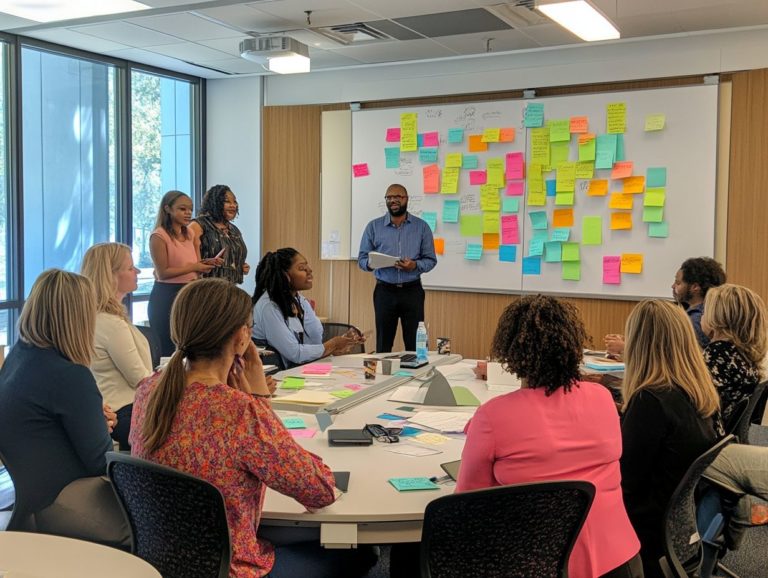5 Must-Have Skills for Today’s Leaders
In today s fast-paced and ever-evolving business landscape, effective leadership demands more than just a title. You need to master essential skills that drive results while fostering team collaboration and innovation.
This article highlights five must-have skills every leader should cultivate: effective communication, adaptability, emotional intelligence, strategic thinking, and empathy.
You ll discover why these skills are vital, how to develop them, the benefits they offer in overcoming challenges, and their significant role in enhancing team dynamics.
Let s dive into the core competencies that can elevate your leadership and set you apart in the competitive arena.
Contents
- Key Takeaways:
- 1. Effective Communication
- 2. Adaptability
- 3. Emotional Intelligence
- 4. Strategic Thinking
- 5. Empathy
- Why Are These Skills Essential for Leaders?
- Frequently Asked Questions
- What are the 5 must-have skills for today’s leaders?
- Why is effective communication crucial for leaders?
- Why must leaders be adaptable?
- What is emotional intelligence?
- How does strategic thinking help leaders?
- Why is problem-solving critical for leaders?
Key Takeaways:

- Strong communication skills are crucial for leaders to effectively convey their vision and goals to their team and stakeholders.
- Adaptability is necessary for leaders to navigate uncertain and changing environments, making necessary adjustments along the way.
- Emotional intelligence helps leaders understand and manage their own emotions, fostering a positive and productive work environment.
1. Effective Communication
Effective communication is a cornerstone of leadership skills. It cultivates a collaborative environment where employee engagement and relationship-building flourish.
This multifaceted skill embraces both verbal and non-verbal communication, where your tone of voice and body language play crucial roles in how your messages are perceived. Listening skills are equally vital; they enable you to grasp your team’s perspectives and address concerns with intuition.
Take Tim Cook of Apple Inc. as an example. He consistently fosters open dialogue with his employees, building trust and making it clear that feedback is not just welcomed but valued. Such interactions not only enhance team dynamics but also ignite innovation, ensuring that everyone feels heard and motivated to contribute meaningfully.
2. Adaptability
Adaptability is an essential leadership skill that enables you to navigate change with finesse, responding to evolving contexts and challenges while keeping your team s morale and productivity intact.
In today’s fast-paced work environment, where technological advancements and market dynamics can change in the blink of an eye, your ability to pivot and make informed decisions can truly determine your company s success or failure. By embracing change, you can inspire your team to follow suit, fostering a culture of resilience and collaboration.
Consider the example of Netflix, which has thrived by continuously adapting its business model from DVD rentals to streaming services allowing it to swiftly capitalize on consumer preferences. Similarly, Amazon showcases adaptability through its constant evolution of services in response to customer needs, illustrating how effective decision-making is intricately linked with a commitment to flexibility.
3. Emotional Intelligence
Emotional intelligence is an essential leadership skill that enables you to build effective relationships. It helps you understand and manage your own emotions while motivating your team through various techniques.
This understanding involves managing your emotions and recognizing how others feel. As a leader with emotional intelligence, you can skillfully navigate the complexities of workplace dynamics, fostering a collaborative environment where open communication flourishes.
Consider a case study from a technology firm that highlighted this point: managers who practiced active listening and empathy saw a remarkable boost in team morale and productivity. These leaders created spaces where employees felt valued and understood, ultimately leading to innovative solutions and a stronger commitment to organizational goals.
These relational competencies illustrate that emotional intelligence isn t just a nice-to-have; it s a fundamental requirement for successful leadership.
4. Strategic Thinking

Strategic thinking is an essential leadership skill that enables you to craft long-term plans and innovative solutions while enhancing critical thinking among your team members.
This skill not only drives comprehensive planning but also nurtures a culture of proactive decision-making. It helps you navigate complex challenges and seize valuable opportunities. For instance, thought leaders at Gallup underscore the importance of strategic thinking in fostering engagement, which ultimately leads to improved conflict management and more effective negotiation strategies.
By adopting a strategic approach, you become better equipped to anticipate potential conflicts and address them before they escalate. Insights from the World Economic Forum reveal that organizations prioritizing strategic thinking tend to negotiate more successfully, often achieving win-win outcomes by aligning their long-term vision with the needs of stakeholders.
5. Empathy
Empathy stands as a cornerstone of emotional intelligence, enabling you to forge strong relationships within your team and cultivate an atmosphere of trust and collaboration.
When you actively listen to your team members and genuinely understand their perspectives, you create a culture where everyone feels valued and heard. This approach enhances team dynamics and elevates engagement and motivation. Individuals are far more inclined to go the extra mile when they sense that their contributions truly matter.
Take Satya Nadella, for example. As CEO of Microsoft, he exemplifies the strength of empathetic leadership. By fostering a growth mindset, which means believing that abilities can improve with effort and learning, and encouraging open dialogue, his commitment to understanding the needs of his team has profoundly transformed Microsoft s culture. This transformation has resulted in increased innovation and elevated employee morale.
Why Are These Skills Essential for Leaders?
The skills of effective communication, adaptability, emotional intelligence, strategic thinking, and empathy are crucial for every successful leader! Mastering these abilities significantly enhances employee engagement and enables decision-making. For organizations looking to strengthen their leadership pipeline, implementing strategies for developing future leaders nurtures a culture of high-performing teams that can adeptly manage conflict and drive innovation.
Recent studies from the American Management Association highlight that leaders who shine in these areas not only elevate overall morale but also play a key role in reducing turnover rates within their organizations. Research from Development Dimensions International shows that emotionally intelligent leaders foster collaboration and trust, resulting in a more inclusive workplace environment.
Strategic thinking enables you to anticipate market shifts and align your team’s efforts toward common goals, thus enhancing productivity and overall performance. By cultivating these skills, you create a profound impact on both employee satisfaction and organizational success.
How Can One Develop These Skills?
Developing your leadership skills think emotional intelligence, strategic thinking, and effective communication can be achieved through personal development initiatives, coaching, and mentoring. It can also involve the application of targeted motivation techniques.
Organizations like Interact and Brandon Hall Group offer an abundance of resources, including specialized training programs tailored to enhance these vital skills. By engaging in mentorship opportunities, you can learn directly from seasoned leaders, gaining invaluable real-world insights and guidance.
Utilizing online platforms and forums can help you connect with peers and experts, fostering collaboration and the exchange of innovative ideas. By immersing yourself in these structured opportunities, you can adeptly navigate challenges while honing your abilities, laying a solid foundation for your future success.
Start developing these skills today for immediate improvements in your team and organization!
What Are the Benefits of Having These Skills as a Leader?

Strong leadership skills do more than just elevate employee engagement. They significantly enhance organizational effectiveness, leading to improved team dynamics and overall performance.
Studies reveal that organizations with skilled leaders enjoy a remarkable 21% increase in profitability and a 41% decrease in employee turnover, according to Gallup. These figures highlight the tangible benefits that stem from effective leadership.
Northeastern University points out that leaders who nurture a positive workplace culture create an environment ripe for collaboration, innovation, and a genuine sense of belonging among team members. This hidden benefit translates into heightened morale and increased productivity, setting off a virtuous cycle where motivated employees propel further success.
Therefore, the influence of exceptional leadership resonates throughout the entire organization, fostering both immediate results and sustainable growth over the long term.
How Can These Skills Help in Overcoming Challenges?
Leadership skills such as conflict management, decision-making, and adaptability are essential in overcoming challenges. They enable you to navigate crises and inspire your team to rise above adversity.
In today s ever-evolving business landscape, you may frequently encounter challenges like managing diverse teams, addressing resistance to change, and fostering innovation under pressure. For instance, during a significant organizational shift, a leading technology firm adopted comprehensive decision-making frameworks (methods to make choices better) that not only streamlined processes but also encouraged employee feedback. This approach minimized conflict and facilitated smoother transitions.
Similarly, a prominent healthcare organization demonstrated remarkable adaptability during a crisis by enabling leaders at all levels to make informed decisions quickly. These real-world examples illustrate how honing effective leadership skills can transform obstacles into opportunities, driving both organizational success and employee morale.
What Are the Consequences of Lacking These Skills as a Leader?
Lacking essential leadership skills can lead to a noticeable drop in employee engagement and ineffective motivation techniques. Ultimately, this results in a decline in both organizational performance and morale.
Studies reveal that organizations suffering from poor leadership can experience turnover rates that are up to 30% higher, as employees often seek out a more supportive work environment. A Gallup study reveals that only 30% of employees feel engaged at work, with inadequate leadership being a primary culprit behind their dissatisfaction.
Without strong leaders, confusion can easily arise regarding team objectives. This hampers productivity and cultivates a culture of complacency. Conversely, effective leadership creates a cohesive workforce, enhances communication, and significantly boosts overall satisfaction. This underscores the critical importance of developing these competencies within management.
How Can These Skills Lead to Better Team Dynamics and Results?
Developing leadership skills like emotional intelligence and effective communication can significantly elevate your team’s dynamics. This results in a cohesive, high-performing unit that consistently achieves remarkable results.
When your team members feel understood and valued, their willingness to collaborate naturally increases. This paves the way for innovative ideas and solutions.
Take, for instance, a technology company that transformed its product development process by instituting regular feedback sessions. In these meetings, every team member was encouraged to share their thoughts openly. This atmosphere of trust and belonging not only motivated the employees but also ignited creativity, culminating in a groundbreaking software release.
Strong leaders like you exemplify active listening and adaptability, ensuring that everyone feels enabled to contribute. This approach ultimately fosters a culture of continuous improvement and shared success, driving the team toward greater heights.
Frequently Asked Questions

What are the 5 must-have skills for today’s leaders?
Today’s leaders need five essential skills: effective communication, adaptability, emotional intelligence, strategic thinking, and problem-solving.
Why is effective communication crucial for leaders?
Effective communication helps leaders convey ideas clearly and build strong relationships. It also motivates team members to perform at their best.
Why must leaders be adaptable?
In a fast-paced business world, adaptability is key. Leaders must adjust to new challenges and technologies to stay ahead.
What is emotional intelligence?
Emotional intelligence is the ability to understand and manage emotions both yours and others’. This skill is vital for making strong connections and resolving conflicts.
How does strategic thinking help leaders?
Strategic thinking enables leaders to see the bigger picture. It prepares them to anticipate challenges and make informed decisions.
Why is problem-solving critical for leaders?
Leaders face challenges regularly. Being a good problem solver is essential for achieving goals and driving growth.






